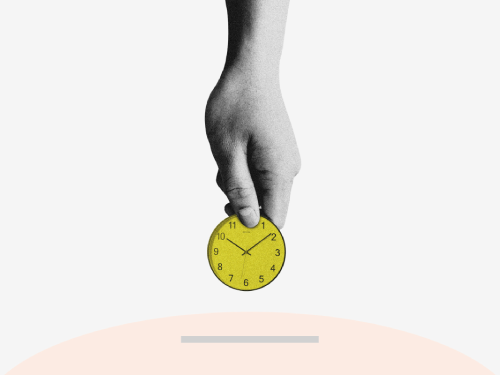For this week’s No More Ls column, we’re looking at the premium cost of paying for things that make our lives easier: the convenience tax.
By Lisa Hannam
We all do it. We rationalize paying a higher price for something because it’s more convenient. It saves time. Makes life easier. You can think of it as a convenience tax—a little bit extra we spend because we choose to, and it’s worth it. Or, is it? I spoke with two accountants, who spend their days discussing costs and expenses, to find out how we can take a business approach to these non-essential expenses in our daily lives.
Accountant Stefanie Ricchio, CPA, CGA, walks through financial statements with her clients and breaks down the expenses. “There’s certainly convenience tax for work and business. I’m putting expenses into categories and then pushing back, asking clients to talk me through what they’re spending.”
It’s similar for Randy Roopchan, founder of Rockwood Accounting. “A lot of times, I’m working with my clients to figure out, ‘Is this expense worth it?’, ‘Is this doing what you thought it would do?’, ‘Is it providing value?’, and ‘Is it making the process easier?’,” he says. For personal expenses, he asks a similar question: “Is it providing a positive convenience?”
Taking this business mindset to your personal expenses can also help you manage the convenience tax you pay. A good first step is to look at your credit card and chequing account statements, and recognize which purchases are motivated by convenience. The second step is to evaluate their value.
5 types of convenience tax Canadians pay
The reason some of us unknowingly pay more for convenience is because that convenience isn’t always obvious. To get some clarity, Ricchio broke down the five general types of convenience tax purchases and what exactly we’re paying for.
- Ease of time
This is the most obvious one: Saving us time. Instead of preparing food from scratch, we like the convenience of everything from takeout and meal delivery to prewashed and cut-up ingredients. But we also pay for the time savings we get from rideshare apps instead of public transit, dog walkers instead of going to the park, and so on. - Ease of mind
We should be forgiven for missing the emotional convenience tax, as our minds were elsewhere thinking or stressing about other stuff. But our wallets don’t forget. This form of convenience “is paying for our problems to disappear,” says Ricchio. Buying a new appliance instead of investigating a fix for what you have, shopping for new socks because you don’t feel like doing laundry, and accepting a lower salary because negotiating a higher one seems stressful. (Read The Get’s interview with Emily the Recruiter on how to avoid the last one). - Ease of delegating tasks
Getting something off our plate is definitely a convenience. This is a common strategy Ricchio sees for her business clients, but it also affects everyday Canadians. House cleaning can fall here, but it can also include filing personal income tax, meal prep, yard maintenance and more. - Ease of organizing your stuff
Ricchio calls this an administrative-style convenience tax. It could be a premium calendar app, paying movers to pack up boxes, and more. And generally we just accept expenses we have now, such as bank fees or cell phone roaming charges, without shopping around. - Ease of technology
These are expenses, Riccio says, for lifestyle technologies. Apps and digital services (from streaming to data storage) promise greater storage or easier access. But often we pay for two or three apps that can perform similar services, when we should learn to use any one of them. Ricchio calls this “subscription bloat.”
The issue isn’t paying for convenience, and neither Riccio nor Roopchan would suggest you punish yourself by avoiding the convenience tax completely. Who has time to do, feel, organize, access, watch and get all this stuff done? Instead it’s about recognizing the cost for what it is and deciding if that cost is worth it.
So, is the premium for convenience worth it? How to decide
The convenience tax is not just a necessary byproduct of the advanced (and expensive) world we live in. Sure, products and services evolve. But sometimes there are cheaper options (or ones you’ve already paid for). And that’s the point.
For example, Ricchio points to ordering food delivery: “Why are you paying that additional premium when you’re already spending a fair amount of money on groceries?”
As both accountants suggested, you have to consider the value for you. Roopchan applies the food delivery example to himself. “I was spending 700 bucks at the grocery store and then $200 or $300 on eating out. So about $1,000 a month on food, which is high, but I really like food,” he says. As his business grew, he was eating out more and more—and feeling guilty about it. “Then I looked at the numbers. I was spending about $400 to $500 at the grocery store and $400 to $500 on eating out.” The total spend was the same. “Now, if I eat out and I’m working a lot, it doesn’t give me anxiety.”
Other ways to evaluate:
- Can you do this yourself? Consider your hourly wage to determine if a service really saves you time and even money.
- Make sure you’re not being double charged by purchasing the same convenience from multiple services.
- Does your spending on convenience align with your ultimate financial goals and fit within your budget?
Is this clichéd money advice?
Yes, maybe this seems like the same ol’ advice. That daily latte is expensive, and you have a perfectly good coffee maker at home. But the key is evaluating the expense in the light of your values and your financial goals.
Take inspiration from Ricchio and Roopchan, and look at how you’re spending and if a convenience tax is worth it.
It’s a trade-off. “You’re always trading money for convenience,” says Roopchan. “Are you getting real value from that cost?”
Lisa Hannam is an award-winning editor and journalist, and she is the Editor-in-Chief of The Get. She has previously been at the helm of celebrated Canadian publications, including MoneySense. She completed the Canadian Securities Course in 2024.
Read more from this issue of The Get:
- Is it true that closing old credit cards boosts your score?
- MVP: Oscar-nominated filmmaker and activist Julian Brave NoiseCat
- How to get family to stop asking you for money
- Black Friday vs Boxing Day—which sales day in Canada is better for deals?
-----------------------------------------------------------------------------------
The Get is owned by Neo Financial Technologies Inc. and the content it produces is for informational purposes only. Any views and opinions expressed are those of the individual authors or The Get editorial team and do not necessarily reflect the official policy or position of Neo Financial Technologies Inc. or any of its partners or affiliates.
Nothing in this newsletter is intended to constitute professional financial, legal, or tax advice, and should not be the sole source for making any financial decisions. Past performance is not a guarantee of future results. Neo Financial Technologies Inc. does not endorse any third-party views referenced in this content. Always do your due diligence before deciding what to do with your money.
© 2025 Neo Financial Technologies Inc. All rights reserved.



